
MEET THE
CHARACTERS
Making Way is a two-volume novel set at the time of the American Revolutionary War. It is a dynamic tale that depicts how that era of American history impacted the lives of a diverse set of individuals: some young, some older; some experienced at life and the sea, others new to the adventures of both; some men, some women, but all inextricably connected together by a whirlwind of events. Here’s a glimpse into the lives of these characters and how they begin to be affected by this tumultuous era.
Making Way: Sailing into the Revolutionary Storm
The Grandpa

Description
Experiences
A man keenly tuned into the differences that can result from those in different generations. His long life has been marked by choices that led him to embrace the comfort of his local community -- the tiny Cuttyhunk island. He is a deeply value-driven man who is eager to draw his own family closer to the recognition that we are all linked to nature as conservators. If we do not respect nature, especially the sea and the atmosphere, we will suffer untold consequences. He lives with the modest objective of sharing with those closest to him how to face tough decisions and to "see what others do not see, learn what others do not learn, and tread lightly on history."
An old man walks slowly across the weathered landscape of Cuttyhunk. He is a difficult, crusty, and critical man whose only soft spot is his affection for the sea. He walks the small island from end to end every day except for the harshest of winter days. He is a singular man, not unhappy when alone. He has a kinship with the sea and all those who have lived and written its rich history. He has a vast collection of seafaring stories and takes every opportunity to swap stories and legends with his peers on the island
He worries that technology is replacing contact with the real world and that the crutches of clicks and gadgets, instant communications, and packaged answers are leading to a life of frustration and dismay. To him, young people have no choice but to face and embrace this reality if they are to become the stewards of the Earth. They will do it enthusiastically or reluctantly, but they must do it.
At one point, Laurel's grandfather, fearing he had played his conversation too carefully, responds, “Well there is a long and involved story that the old salts here on the island tell of the adventures of some kids who lived back in those times. Maybe you want to hear it.”
Laurel
Description
Experiences
A young girl typical of most of her peers. She has ideas that are not yet refined, but she actively thinks about the vast range of things that make life complex for all in her generation. She seeks to learn how choices shape one's life. She filters each episode of her grandpa's historical tale finding meaning for her life and for those around her. Her grandfather becomes her guide and ours through the adventure. Laurel's curiosity and persistence draw us deeply into the story.
Laurel is a cute, bright, young girl. She is verbal and inconsistently adventuresome. She is quite attached to her prickly grandfather in spite of his demeanor. She seems to innately care for him because, in her eyes, he so often appears worried and sad. He is indeed worried. Worried about her. He believes her to be too sheltered, too comfortable, too entitled. Her nine years has been full of activities, material things, and positive responses to her every wish.
Laurel’s life at home revolves around endless activities, peer pressures, and distractions of a mostly technological sort. She is quite typical of the Twenty-first century generations. Her time on the island will challenge her to gear down, take in her surroundings, and search for discipline and focus. Her Grandfather imagines all of this for her, while aware that these are not the lessons that words can teach.
Alan Sydney Symonds Eldridge
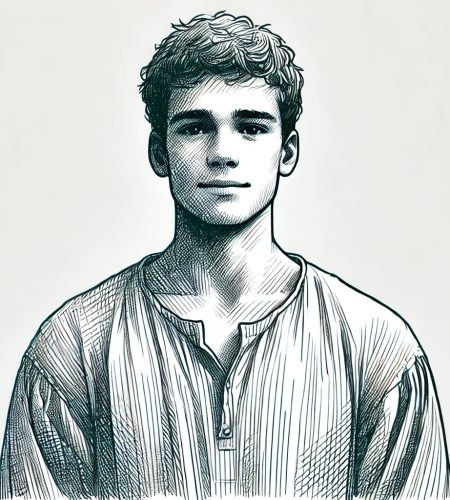
Description
Experiences
Alan lives one day at a time. He has never had the luxury of planning for tomorrow. He has no experience with community or personal relationships. As an emerging adult, he is inexperienced with recognizing consequences of his actions or of calculating outcomes.
Pressed into tasks impacting others, his life forces him to make choices he finds harrowing.
Alan Sydney Symonds Eldridge betrays his elegant and noble-sounding name. He is nineteen. Tall and strong, he is dressed in the barest of clothes, a seaman’s shirt, a common laborer’s pants, tight around the shape of his legs and gathered just below the knees. He appears intent, struggling to exude control over his life.
He sees himself in a man’s world. Not by choice, but comfortably by default. Self-taught except for random reading lessons from an old salt, Alan is prone to draw lessons from mere scraps of experience and information. He finds comfort in observing that many animals of both land and sea after nurturing their young would abandon them. He prefers to believe that is the natural order of things.
He knows male camaraderie and responsibility of the sort common in business and duty. But nothing of the bonds or ties of emotional attachment. Alan thinks of himself as a boy in a man’s world and, with time and effort, he will become a man in a man’s world.
In one tense situation and with his very existence at risk, he steps out of his real personality. He boldly lies, “I am the son of Sir Eldridge of the Massachusetts Eldridges. We own the ships you sail on. Unless you plan on changing careers and leaving the Colonies for the wilderness, I say you pay what COMMERCE is due. I can assure you that if you do not, your captain will lose his ship and you both will be casualties on your next voyage. Perhaps you will make good chum.“ On my honor as a gentleman, I will track you down and see you hanged. No, better tortured and hanged, if you do not appear here in two days with the balance. My ship and I sail in two days. That may be the balance of your lives if you fail. I don’t care how you come upon the rest, but you will suffer in spades if you fail.” His words are loud and firm.
Na
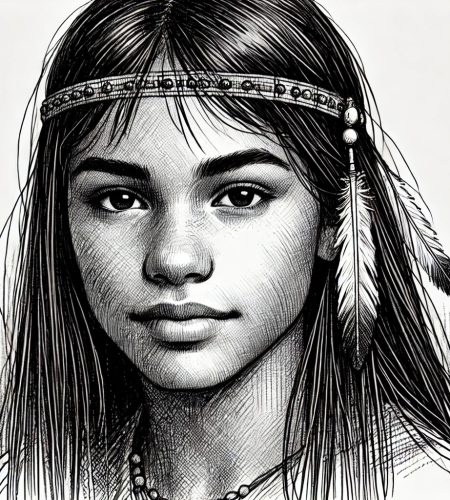
Description
Experiences
A native American whose stable tribal environment is transformed by European newcomers. He is aware of horizons, but unclear about how to approach one. He has a strong spiritual compass built upon ions of native respect for nature. He brings natural sailing skills to the crew. Na aspires to avoid responsibility; comfortable with direction from others.
Na, smelling of fish and uninspired by a future seemingly locked in his small, segregated island village, imagines other places and adventures. Na stands on the Cuttyhunk pier searching in a semiconscious way for his own direction.
Na is a member of a long-established maritime native tribe living on the Elizabeth islands (the British name) and sustaining their lives by fishing. Na has long, jet-black hair pulled back behind his head in a ponytail and anchored by a bright white, sun-bleached whalebone. He is tall, a head taller than most of the European colonists, and has a stocky build. A necklace made from many carefully matched cuttlefish bones rests around his neck. His comfort around the water and his appearance validates that he is comfortable on the sea. Na speaks only the barest English. With Alan the conversation is neither coherent nor smooth. Na appears quiet but is observant and endowed with the beliefs evolved over centuries among the maritime natives.
Adam #46
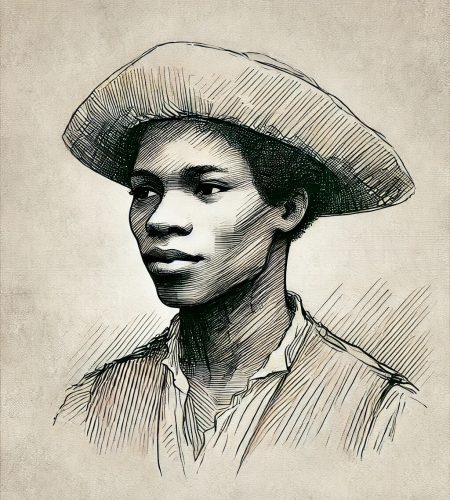
Description
Experiences
A strong young man, ripped from his home by slavers and tumbled through a series of experiences which leave him in colonial New England without even the most essential of personal needs. He has no reason to have faith in any human. Without options, he searches for the most incremental way to get "home".
The last of the trio to form the crew is a dark-skinned man of fifteen. Until very recently he was known simply as number forty-six. Of African slave origin, he was sold to a wealthy ship owner in West Africa who, in his eccentricities, bartered the young slave while in port in the Azores. He has been called many things but chose, as he left the bonds of his sale, to call himself Adam, as he had remembered the biblical story of ‘the beginning’ told by whalers and seamen on his former master’s ship. He is hoping for some new course for himself.
Adam has a long, dense head of dark hair. He is average height (five feet or so), is stick thin but had muscular arms and legs. He is barefoot, walked with a slight limp, and is missing the little finger on his right hand. It appears to have been severed. He has ritual scarring on both of his shoulders visible because of the scant shirt he wears. Adam is a West African who entered the company of white people via the slave trade. He reached the Azores, where the ship captain on whose vessel he was being transported bartered him for an evening with a friendly maiden innkeeper in the port of Ponta Delgada. Number 46, as he was labeled, was a young and strong-looking youth, and the innkeeper wanted him to help with the physical work around the inn. While this was the plan, the fifteen-year-old slave discovered quickly that the management surrounding the inn was so lax, owing largely to the innkeeper’s heavy drinking and relentless liaisons, he was literally at liberty to walk away
Adam’s instinct alone told him not to use his given tribal name. It seemed that no good could come from such an effort. Adebowale Dambudzo Chiamaka is his real name. He has a youthful courage and curiosity, but those qualities are tempered by the reality that he is altogether alone.
Bud
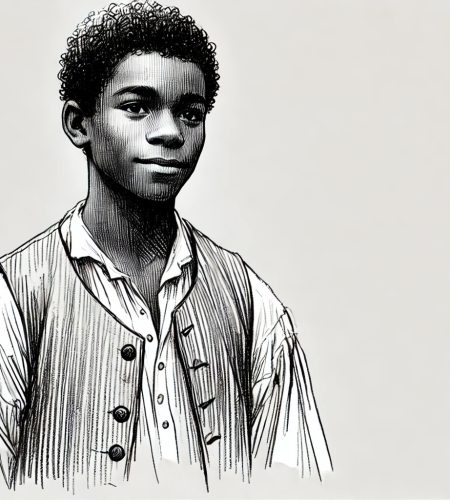
Description
Experiences
After the voyage out of Africa with his father, the two are separated when he is given to Alan as payment for a simple job. He is timid. He has no sense of who he is or where he is. He was the son of an African chief, but is now without an identity. He is a child unsuccessfully searching for an adult role model.
The whaler captain has not become rich and powerful by playing by any other than his own rules. On his previous voyage he had put in to the Canaries. There he purchased a father and son in the slave market. The father has proven to be a proficient harpooner. But the son is a sickly lad, unaccustomed to the sea. Because of these deficiencies, it is the son who the captain intends to give as payment. And so a fourth crew member comes aboard and sails south with the other boys. The crew still has no credible experience and no common vehicle for communication.
Each of the crew members feels an unease about the new guy. They are a motley bunch with little foundation for knowing about or having faith in each other. But this situation raises new concerns.
Adam asks Alan, “Do you own the new guy?”
Na adds, “Can the new guy leave?”
Adam, “Where’s he from? Is he a sailor?”
Alan only shares what he has sorted out, “He will be just like the rest of us. One member of the crew.”
Adam, “Can he walk away if he wants?”
Alan, “Just like the rest of us. He’ll have more choices than he did on the whaler.”
Chris
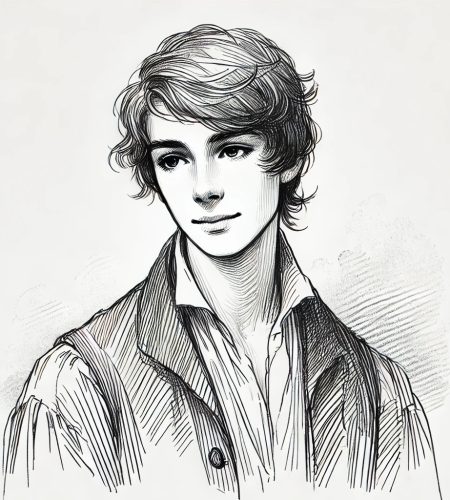
Description
Experiences
Raised by an isolated Cossack clan in colonial America, he lives to go to sea, but is without credentials to get a ship to take him on. He hangs around the harbor and uses his ingenuity to grasp a place on the COMMERCE. His ability to lead his young compatriots is tested over and over again enabling slow progress toward respect by his peers.
At the Peoples' Oratory contest, Chris is the first to speak. He is a thin and short man. He calls himself Chris and spoke poignantly about how life in the colonies requires all people to reinvent themselves to meet the challenges of everyday life. He insists that this re-engineering that new colonists face make all people better and stronger. His voice has a thoughtful texture that surprises Alan.
Chris remounts the gazebo and accepts the prize. He then darts toward the band of four, Na, Adam, Bud, and Alan. With or without good reason, they are feeling proud and have imagined that Alan has won the competition and deserved the gold. Dejected, they feel that they have been robbed of the reward.
Chris, clutching the gold coins, seems to know the guys were off the COMMERCE, and he asks, “Do you guys need another sailor?”
Alan, “We’re struggling to keep us fed. Don’t think we need another mouth to feed.”
Chris admits, “I really need to get out of Charleston. Isn’t there any way I can join the crew?”
Bud, on his own volition and with no prospect that it would happen, blurts, “You could give us the gold coins; then we could make room.”
The others quizzically look at each other and await Alan’s reaction to Bud’s unauthorized bargain. Alan, hesitates.
Chris leaps, “Deal made.” He grabs Alan’s right wrist with his left hand, squeezes to prompt it open, and quickly places the three coins in Alan’s palm. Chris repeats, “Deal made. Deal made.” And so it is that Chris has become part of the crew.
Little is known of who Chris is or why he needs to get out of Charleston. Perhaps in time more would become clear.
Neville Strathclyde
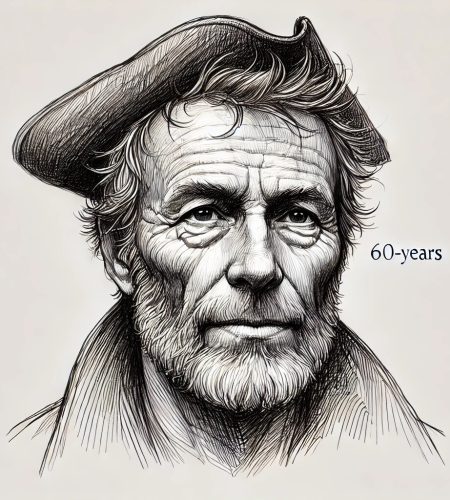
Description
Experiences
Nev is an old sea dog who became a derelict after an injury to his leg during his last voyage forced him to abandon everything associated with his identity. Physically unable to pull his weight at sea, he is mentally orphaned from all things he values. He seeks companionship, but has no prospects. No human can fill his void, but a sleek, new ship of wood and fabric might.
As Chris and Alan search for a veteran sailor for the crew, they observe a an old salt who in typical crusty, garbled fashion is weaving a tale of harrowing struggles against some of the famous pirates of the day.
“Waves were crashing over the deck every few seconds. They were mountainous, some cresting over the tops of the masts. Men were washed overboard throughout the night. By morning, only ten of us remained. All the sails ripped to shreds and the decks awash with blood and body parts. Beware mates, you want to avoid the ‘Horn.’ That was where I lost the use of my leg.”
Neville Strathclyde was his proper name, but only the barmaid knew his surname because of the many incidents where the port constable had to deliver old Neville home. Neville is too old, with at least sixty hard years, and a left leg that suffers from constant pain. When he walks, he dragged that leg around like a tethered sack of flour. Chris gauges that Neville is unhappy about having been put to pasture and divorced from the sea in spite of having survived his harrowing journeys. He angrily recounts how he was summarily dismissed by the ship’s owner along with all the other survivors when they limped back to Portsmouth. He hated that the reward for survival is divorce from his livelihood. But the stark reality is that Neville could not pull his own weight on a working, sea-going vessel. Beyond that, it could be damaging to have veterans telling tales of danger and death to new sailors on a vessel.
.He is a hulk of a character, wrinkled, weather-beaten, and depressed.
Nev had been divorced from the sea for many years and had sunk to telling tales and arguing with other orphans of the sea in dank taverns. He drank too much and had abandoned all sense of responsibility to himself or to the job that had filled all of his life. He is a lost soul who had grown to feel no use for rules, government, or religion.He begins to recollect the mysteries of nature, weather, the moods of the sea, life on the water. Nev is not nor would he ever be an intellectual, but the prospect of a new job provides a path for Nev to reinvent himself
Rose
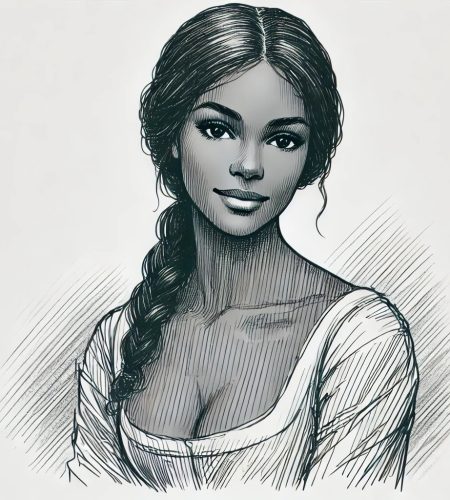
Description
Experiences
Rose is a seminal thinker whose role as a hand-maiden and servant to an over-rated woman thespian gives her a great deal of latitude to move about the colonial cities where her mistress performs. She has the ability and the opportunity to establish a sophisticated understanding of society and her place in it. She recognizes the limitations but seizes on every bit of space her unique position affords.
Rose finds her flexibility and maneuverability useful in linking slaves bound by their captivity and those that have fled. She uses her understanding of the way things work (and don't work) to improve life and security of those seeking control of their lives. She connects with everyone in the colonial communities by appearing non-threatening and resolved to the status quo. She connects in the most unusual way with the boys of the COMMERCE. She will be challenged in ways she had not imagined.
Kelly
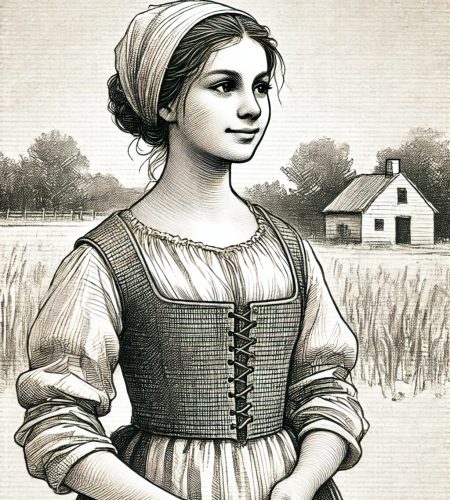
Description
Experiences
Kelly discovers just enough about the world outside her village to imagine opportunities that will prove to be just out of reach. Comfort, status and peer respect (if not envy) are in her thoughts about the future. But in Colonial America, a young woman needs a "ticket" out of the village life. Could the crew of the COMMERCE prove the enabler?
As daughter of the most important figure in the prosperous riverside community, Kelly has a vision of grand opportunities and status in the region's major cities. She has ambition and imagines joining the elite circles when she departs the small town of Burns Landing. Kelly gauges her relationships as steps toward a life of comfort and security.
Lass

Description
Experiences
As a recent arrival with her family from Scotland, Lass is apprehensive and shy when confronting all that is new in her new surroundings. She is slow to engage others and is cautious. Lass observes and is searching for comfortable connections with other young persons.
Like the other characters in the story, Lass is new to the Colonies. She seeks to conform and combine her teen-age vision of life with the unsettled and rapid-changing community in which she lives. Her hopes and dreams are just taking shape. She finds in Chris the kindred spirit that the young girl needs to locate herself. It becomes a relationship that defies description.
Address
DePaul University
Department of Political Science
990 West Fullerton Avenue
Chicago, IL 60614-2458
Contact
- DFarkas@DePaul.edu
- +1 847-251-2671